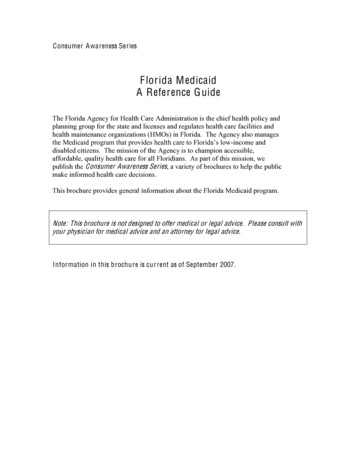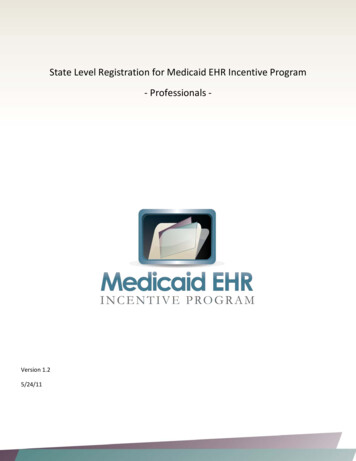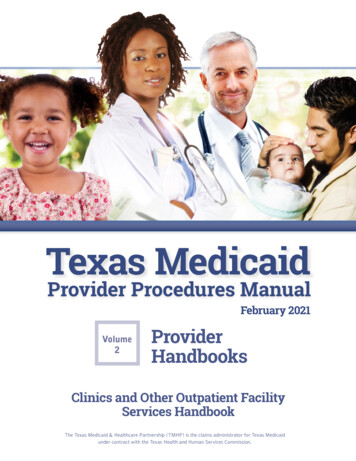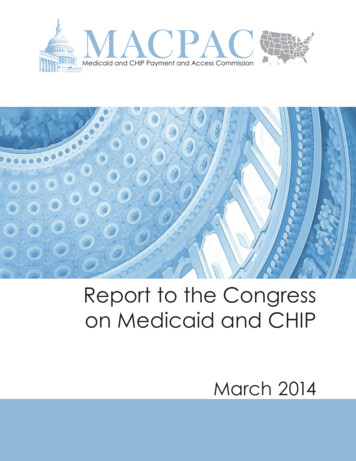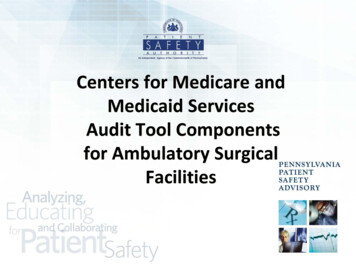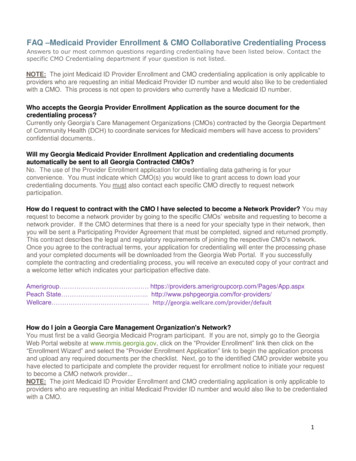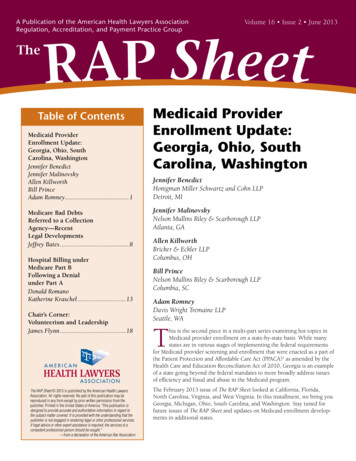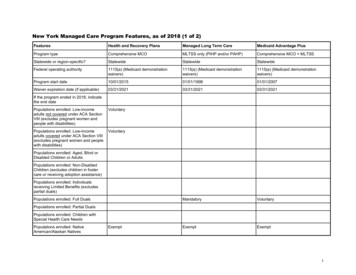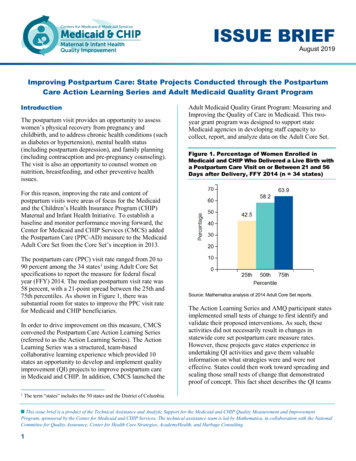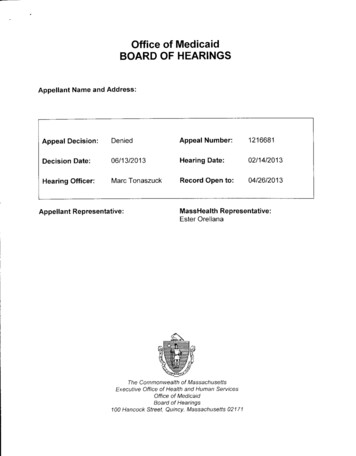
Transcription
Office of MedicaidBOARD OF HEARINGSAppellant Name and Address:Appeal Decision:DeniedAppeal Number:1216681Decision Date:06/13/2013Hearing Date:02/14/2013Hearing Officer:Marc TonaszuckRecord Open to:04/26/2013Appellant Representative:MassHealth Representative:Ester OrellanaThe Commonwealth of MassachusettsExecutive Office of Health and Human ServicesOffice of MedicaidBoard of Hearings100 Hancock Street, Quincy, Massachusetts 02171
APPEAL DECISIONAppeal Decision:DeniedIssue:Long Term CareDecision Date:06/13/2013Hearing Date:02/14/2013MassHealth Rep.:Ester OrellanaAppellant Rep.:Hearing Location:Springfield MassHealth Enrollment CenterAuthorityThis hearing was conducted pursuant to Massachusetts General Laws Chapter 118E,Chapter 30A, and the rules and regulations promulgated thereunder.JurisdictionThrough a notice dated 08/09/2012, MassHealth denied appellant's application forMassHealth long term care (LTC) benefits because MassHealth determined that assetsheld in trust are countable and exceed program limits {130 CMR 520.003, 520.016;Exhibit 1). The appellant filed this appeal in a timely manner on 08/22/2012 (130 CMR610.015(B); Exhibit 2). A hearing was scheduled to take place at the SpringfieldMassHealth Enrollment Center (MEC) on 12/11/2012; however, it was rescheduled uponrequest of the appellant's counsel due to a death in her family. The fair hearing wasrescheduled to take place on 01/09/2013; however, it was rescheduled upon request ofthe appellant's counsel due to previously scheduled dental procedures. The fair hearingwas rescheduled to take place on 01/28/2013; however, it was rescheduled upon requestof the appellant's counsel. The fair hearing took place on 02/14/2013 in the SpringfieldMEC (Exhibits 3A, 3B, 3C and 3D). Denial of assistance is valid grounds for appeal (130CMR 610.032).Action Taken by MassHealthMassHealth denied appellant's application for MassHealth long-term care benefits.Page 1 of Appeal No.: 1216681
IssueThe appeal issue is whether MassHealth was correct, pursuant to 130 CMR 520.003,520.023, in determining that assets held in trust are countable to appellant and exceedprogram limits.Summary of EvidenceThe MassHealth representative testified that the appellant is 84 years of age and ismarried. His wife lives in the community in an assisted living facility. Appellant entered askilled nursing facility on 05/04/2012. A MassHealth long term care application wassubmitted on his behalf on 06/25/2012, seeking MassHealth eligibility beginning06/01/2012, the date after his Medicare benefits stopped paying for his care (Exhibit 5).On 08/09/2012, MassHealth denied appellant's application due to the couple's assetstotaling 335,255.00 that were in excess of the 115,640.00 program limits. Thecountable assets are comprised of real estate held in trust ( 222,800.00) and bankaccounts of 112,455.00 both of which are deemed countable to appellant in a long termcare eligibility determination (Exhibit 1).At issue in this appeal is a trust executed bythe same date by a transfer of real estateirrevocable trust. In the first paragraph of theare the grantors of the trust and trusteesfollowing uncontested provisions:the appellant on 10/20/2006 and funded oninto the trust (Exhibit 6). The trust is antrust, it states that the appellant and his wifeof the trust. Trust provisions include theArticle I statesThis trust agreement is irrevocable. The grantors hereby relinquishes (sic) allpower to alter, amend or revoke this trust agreement in whole or in part. Thesignificance of this trust agreement has been fully explained to the grantors by thegrantors' legal counsel.Article II statesDuring the lifetime of the grantors, the trustee shall hold, manage, invest, andreinvest the trust property as provided in this Article II. The trustee shall pay all thenet income of the trust property, quarterly or more often, to or for the benefit ofeither or both grantors.None of the principal of the trust may be distributed to or for the benefit of eithergrantor under any circumstance. The trustee has no power to distribute theprincipal of the trust property to or for the benefit of either grantor, either grantors'Page 2 of Appeal No.: 1216681
creditors, the estate of either grantor or the creditors of either grantors' estate andshall not do so under any circumstance.Article III statesUpon the death of the first grantor to die the trustee shall continue to hold,manage, invest and reinvest the trust property, as provided in this Article III. Thetrustee shall pay the net income of the trust property, quarterly or more often, to orfor the benefit of the surviving grantor. None of the principal of the trust may bedistributed to the surviving grantor under any circumstance. The trustee has nopower to distribute the principal of the trust property to or for the benefit of saidsurviving grantor, said surviving grantor's creditors, the estate of said survivinggrantor or the creditors of the said surviving grantor's estate and shall not do sounder any circumstance. With the consent of the surviving grantor, if competent,or with the consent of said surviving grantor's legal guardian, if said survivinggrantor is incompetent ., distributions of principal may be made to or for thebenefit of the grantors' daughter ., and her issue, as the trustee conidersadvisable for their health, education, support and maintenance.Article VII states [The trustee has the power to](a) to invest, reinvest, hold and administer the trust estate in any state orjurisdiction; to invest some or all of the trust estate in investment trusts, moneymarket funds, or common trust funds established or administered by the trustee.(c) to sell, purchase, exchange, option, mortgage, lease and make contractsconcerning real and personal property for such consideration and upon such termsas the trustee may determine, which contracts may extend beyond the terms ofany trust; to execute deeds, transfers, mortgages, releases, assignments,mortgage discharges, leases and other instruments of any kind, without liability onthe part of any person dealing with the trustee to see to the application of theproceeds of any such, sale, exchange, mortgage, lease, option, contractassignment or other instrument; to foreclose and to purchase at foreclosure sales.(d) to receive all rents or other amounts due from any rental or other business realestate, including any personal property used in conjunction with the real estate; tomaintain, repair, improve and manage all such property; to maintain insurance andpay all taxes and assessments on or with respect to such property; to extend,renew, replace, increase or pay off any mortgage; to abandon all or part of suchproperty ; to adjust boundaries; to grant easements; to dedicate for public use; tojoin with co-owners and others in dealing with real estate in ay way; to partition; toenter party-wall contracts; to insure or perfect title; to demolish or erect buildings,(m) to borrow money from time to time upon such terms as the trustee determinesfrom any person, firm, corporation, estate, trust or other entity, including from anyprofessional trustee under this trust agreement; to execute promissory notes orother obligations for monies so borrowed, whether or not extending beyond thePage 3 of Appeal No.: 1216681
term of the trust and, if required, to secure the payment of any amounts soborrowed by mortgage or pledge of all or any part of the trust estate,(p) to retain, purchase, dispose of or otherwise deal with life insurance, annuities,endowment policies or other forms of insurance on the lives of any one or morebeneficiaries and to pay the premiums and costs for such insurance from theprincipal or income of such beneficiary's trust.Article VIII states(a) either grantor, may, at any time, without the consent of any person, by writteninstrument delivered to all trustees, remove any trustee, fill any vacancy in theoffice of trustee, appoint successor trustees and appoint additional trustees.Through a legal opinion by the MassHealth legal department submitted at hearing by theMassHealth representative, and through a reply to the appellant's response to the legalopinion,1 MassHealth analyzed the trust under provisions of 42 USC §1396p(d), and 130CMR 520.023(0), as the trust is irrevocable and dated after 1993. Specifically,MassHealth argues that the explicit terms of the trust mandate that the income from thetrust is paid to the appellant and his wife. Additionally, under 130 CMR 520.023(C)(1)(a),42 USC § 1396p(d)(3)(B)(i); and 42 USC § 1396p(d)(2)(B), 42 USC §1396p(d)(2)(C)(ii),there are circumstances under the trust provisions that would allow appellant to accessthe corpus of the trust, and therefore the resources are considered available andcountable to appellant. Citing Dohertv v. Director of the Office of Medicaid. 74 Mass.App. Ct. 439, 443 (2009), MassHealth argues that although Article Second of the truststates that the appellant does not retain any interest in trust principal, the countability oftrust principal is not predicated on merely one trust provision, and the whole of theinstrument must be reviewed. MassHealth notes that pursuant to the trust, the appellantand his wife are not only the grantors, but are also the trustees. According to the trust,the trustees have a great deal of control over the real estate held as trust property, as wellas the ability to sell it, mortgage it, or otherwise reinvest the property. Also, the appellant,as one of the grantors, has the power to change trustees at any time. MassHealthasserts that these powers render the trust principal within appellant's control. CitingCohen v. Comm'r. Division of Medical Assistance, 423 Mass. 399, 416 (1996),MassHealth argues that because there are circumstance under which principal can bemade available or used for appellant's benefit, the trust principal is countable indetermined appellant's MassHealth eligibility (Exhibits 5 and 11).Two attorneys representing the appellant's power of attorney appeared at the hearing.They testified that they communicated with the MassHeafth worker and her manager priorto the hearing to ascertain the reasons for the denial of their client's long term careThe record remained open upon request of the appellant's counsel and supplementalpleadings were submitted by the appellant's counsel and by MassHealth (Exhibits 9, 10 and111).Page 4 of Appeal No.: 1216681
benefits. They received contradictory information about the denial and why MassHealthwas counting the trust corpus as assets attributable to the appellant. They requested alegal memorandum from the representative, but it was not provided. As a result, counselwrote to the Board of Hearings, requesting a subpoena requiring the attendance andtestimony of the MassHealth representative at the fair hearing and for the production ofcopies of records, including a memorandum from the MassHealth legal department(Exhibit 12). The request was denied for several reasons, one of which is that counselwould have a full opportunity to advance and/or supplement the appellant's position ifinformation not previously available is presented at hearing through a request to theassigned hearing officer (Exhibit 13). A legal memorandum was presented by theMassHealth representative at hearing and the hearing officer granted the appellant'srequest to keep open the hearing record for appellant's counsel to respond (Exhibits 9, 10and 11).In the appellant's submissions, including the post-hearing brief, counsel argues that thetrust is irrevocable and that there are no circumstances under which he can access thetrust property. There was no dispute that he is the beneficiary of the income from thetrust, or that the appellant and his wife have paid the property taxes and homeowner'sinsurance on the real estate held by the trust. Under the pertinent case law andregulations, the appellant and/or his spouse must have the ability to receive principalunder the terms of the trust, or actually receive an asset, in order to render such asset(s)countable; mere speculation of future events cannot render an asset countable. Counselnext argues that there is no support in any federal or Massachusetts law or case for theposition that having some degree of control over an asset makes the asset countable (solong as the asset is not available to the person directly for his own use). Also, the powersof the trustee enumerated in the trust are ordinary administrative functions of trustadministration that do not in any way permit distributions of principal and the ability toreplace a trustee does not constitute the ability to access principal under any controllinglaw (Exhibit 10).The hearing officer inquired of appellant's counsel if they planned to present evidencethat the community spouse may be entitled to retain excess assets in the event that theappeal is denied.2 Counsel stated that the couple's financial situation did not warrant anappeal on that basis.Findings of FactBased on a preponderance of the evidence, I find the following:1. Appellant is 84 years of age, and is married. Appellant's wife resides in anassisted living facility in the community (Testimony; Exhibit 5).2See 130 CMR 520.017PageS of Appeal No.: 1216681
2. Appellant entered a skilled nursing facility on 05/04/2012. A MassHealth long termcare application was submitted on his behalf on 06/25/2012, seeking MassHealtheligibility beginning 06/01/2012, the date after his Medicare benefits stoppedpaying for his care (Testimony; Exhibit 5).3. On 08/09/2012, MassHealth denied appellant's application due to the couple'sassets totaling 335,255.00 that were in excess of the 115,640.00 program limits(Exhibit 1).4. The appellant's assets are comprised of real estate held in trust ( 222,800.00) andbank accounts of 112,455.00 both of which are deemed countable to appellant ina long term care eligibility determination (Exhibit 1).5. The appellant does not dispute the value of the real estate held in the trust(Testimony).6. The appellant does not dispute the balance of the bank accounts (Testimony).7. On 10/20/2006, the appellant and his wife executed a trust. On the same date,they funded the trust by a transfer of real estate into the trust (Exhibit 6).8. The real estate is the only property held in the trust (Testimony).9. The trust is an irrevocable trust and appellant and his wife are the grantors of thetrust (Exhibit 6).10. The appellant and his wife are named as the trustees of the trust (Exhibit 6).11. Article I of the trust statesThis trust agreement is irrevocable. The grantors hereby relinquishes (sic) allpower to alter, amend or revoke this trust agreement in whole or in part. Thesignificance of this trust agreement has been fully explained to the grantors by thegrantors' legal counsel.12. Article II of the trust statesDuring the lifetime of the grantors, the trustee shall hold, manage, invest, andreinvest the trust property as provided in this Article II. The trustee shall pay all thenet income of the trust property, quarterly or more often, to or for the benefit ofeither or both grantors.None of the principal of the trust may be distributed to or for the benefit of eithergrantor under any circumstance. The trustee has no power to distribute thePage 6 of Appeal No.: 1216681
principal of the trust property to or for the benefit of either grantor, either grantors'creditors, the estate of either grantor or the creditors of either grantors' estate andshall not do so under any circumstance.During the lifetime of the grantors, the trustee shall hold, manage, invest, andreinvest the trust property as provided in this Article II. The trustee shall pay all thenet income of the trust property, quarterly or more often, to or for the benefit ofeither or both grantors.None of the principal of the trust may be distributed to or for the benefit of eithergrantor under any circumstance. The trustee has no power to distribute theprincipal of the trust property to or for the benefit of either grantor, either grantors'creditors, the estate of either grantor or the creditors of either grantors' estate andshall not do so under any circumstance.13. Article III of the trust statesUpon the death of the first grantor to die the trustee shall continue to hold,manage, invest and reinvest the trust property, as provided in this Article III. Thetrustee shall pay the net income of the trust property, quarterly or more often, to orfor the benefit of the surviving grantor. None of the principal of the trust may bedistributed to the surviving grantor under any circumstance. The trustee has nopower to distribute the principal of the trust property to or for the benefit of saidsurviving grantor, said surviving grantor's creditors, the estate of said survivinggrantor or the creditors of the said surviving grantor's estate and shall not do sounder any circumstance. With the consent of the surviving grantor, if competent,or with the consent of said surviving grantor's legal guardian, if said survivinggrantor is incompetent ., distributions of principal may be made to or for thebenefit of the grantors' daughter ., and her issue, as the trustee conidersadvisable for their health, education, support and maintenance.14. Article VII of the trust states [The trustee has the power to](a) to invest, reinvest, hold and administer the trust estate in any state orjurisdiction; to invest some or all of the trust estate in investment trusts, moneymarket funds, or common trust funds established or administered by the trustee,(c) to sell, purchase, exchange, option, mortgage, lease and make contractsconcerning real and personal property for such consideration and upon such termsas the trustee may determine, which contracts may extend beyond the terms ofany trust; to execute deeds, transfers, mortgages, releases, assignments,mortgage discharges, leases and other instruments of any kind, without liability onthe part of any person dealing with the trustee to see to the application of theproceeds of any such, sale, exchange, mortgage, lease, option, contractassignment or other instrument; to foreclose and to purchase at foreclosure sales.Page 7 of Appeal No.: 1216681
(d) to receive all rents or other amounts due from any rental or other business realestate, including any personal property used in conjunction with the real estate; tomaintain, repair, improve and manage all such property; to maintain insurance andpay all taxes and assessments on or with respect to such property; to extend,renew, replace, increase or pay off any mortgage; to abandon all or part of suchproperty ; to adjust boundaries; to grant easements; to dedicate for public use; tojoin with co-owners and others in dealing with real estate in ay way; to partition; toenter party-wall contracts; to insure or perfect title; to demolish or erect buildings,(m) to borrow money from time to time upon such terms as the trustee determinesfrom any person, firm, corporation, estate, trust or other entity, including from anyprofessional trustee under this trust agreement; to execute promissory notes orother obligations for monies so borrowed, whether or not extending beyond theterm of the trust and, if required, to secure the payment of any amounts soborrowed by mortgage or pledge of all or any part of the trust estate,(p) to retain, purchase, dispose of or otherwise deal with life insurance, annuities,endowment policies or other forms of insurance on the lives of any one or morebeneficiaries and to pay the premiums and costs for such insurance from theprincipal or income of such beneficiary's trust.15. Article VII of the trust states(a) either grantor, may, at any time, without the consent of any person, by writteninstrument delivered to all trustees, remove any trustee, fill any vacancy in theoffice of trustee, appoint successor trustees and appoint additional trustees.Analysis and Conclusions of LawIn the case at hand, there are no factual disputes; rather, the issues revolve around theinterpretation of the language of the various trust provisions involved. The trust isproperly considered in the context of both state and federal law applying to trusts createdafter 1993, of which pertinent sections follow:Federal law at 42 U.S.C. 1396p (d)(3)(B)(i) states:In the case of an irrevocable trust, if there are any circumstances underwhich payment from the trust could be made to or for the benefit of theindividual, the portion of the corpus from which, or the income on thecorpus from which, payment to the individual could be made shall beconsidered resources available to the individual, and payments from thatportion of the corpus or income (emphasis added).Regulation 130 CMR 520.023 applies to trusts or similar legal devices created on orafter August 11,1993, and follows in pertinent part:Page8 of Appeal No.: 1216681
(C) Irrevocable Trusts.CO Portion Payable.(a) Any portion of the principal or income from the principal (such asinterest) of an irrevocable trust that could be paid under anycircumstances to or for the benefit of the individual is a countable asset.(b) Payments from the income or from the principal of an irrevocabletrust made to or for the benefit of the individual are countable income.(c) Payments from the income or from the principal of an irrevocabletrust made to another and not to or for the benefit of the nursing-facilityresident are considered transfers of resources for less than fair-marketvalue and are treated in accordance with the transfer rules at130CMR520.019(G).(d) The home or former home of a nursing-facility resident or spouseheld in an irrevocable trust that is available according to the terms of thetrust is a countable asset. Where the home or former home is an assetof the trust, it is not subject to the exemptionsof130 CMR 520.007(G)(2) or 520.007{G}(8).(2) Portion Not Payable. Any portion of the principal or income from theprincipal (such as interest) of an irrevocable trust that could not be paidunder any circumstances to or for the benefit of the nursing-facility residentwill be considered a transfer for less than fair-market value and treated inaccordance with the transfer rules at 130 CMR 520.019(G).Following is a summary of the powers and provisions pursuant to the Trust:Article I statesthis trust agreement is irrevocable. The grantors hereby relinquishes (sic) allpower to alter, amend or revoke this trust agreement in whole or in part. Thesignificance of this trust agreement has been fully explained to the grantors by thegrantors' legal counsel.Article II statesDuring the lifetime of the grantors, the trustee shall hold, manage, invest, andreinvest the trust property as provided in this Article II. The trustee shall pay all thenet income of the trust property, quarterly or more often, to or for the benefit ofeither or both grantors.Page 9 of Appeal No.: 1216681
None of the principal of the trust may be distributed to or for the benefit of eithergrantor under any circumstance. The trustee has no power to distribute theprincipal of the trust property to or for the benefit of either grantor, either grantors'creditors, the estate of either grantor or the creditors of either grantors' estate andshall not do so under any circumstance.Article III statesUpon the death of the first grantor to die the trustee shall continue to hold,manage, invest and reinvest the trust property, as provided in this Article III. Thetrustee shall pay the net income of the trust property, quarterly or more often, to orfor the benefit of the surviving grantor. None of the principal of the trust may bedistributed to the surviving grantor under any circumstance. The trustee has nopower to distribute the principal of the trust property to or for the benefit of saidsurviving grantor, said surviving grantor's creditors, the estate of said survivinggrantor or the creditors of the said surviving grantor's estate and shall not do sounder any circumstance. With the consent of the surviving grantor, if competent,or with the consent of said surviving grantor's legal guardian, if said survivinggrantor is incompetent ., distributions of principal may be made to or for thebenefit of the grantors' daughter ., and her issue, as the trustee conidersadvisable for their health, education, support and maintenance.Article VII states [The trustee has the power to](a) to invest, reinvest, hold and administer the trust estate in any state orjurisdiction; to invest some or all of the trust estate in investment trusts, moneymarket funds, or common trust funds established or administered by the trustee.(c) to sell, purchase, exchange, option, mortgage, lease and make contractsconcerning real and personal property for such consideration and upon such termsas the trustee may determine, which contracts may extend beyond the terms ofany trust; to execute deeds, transfers, mortgages, releases, assignments,mortgage discharges, leases and other instruments of any kind, without liability onthe part of any person dealing with the trustee to see to the application of theproceeds of any such, sale, exchange, mortgage, lease, option, contractassignment or other instrument; to foreclose and to purchase at foreclosure sales.(d) to receive all rents or other amounts due from any rental or other business realestate, including any personal property used in conjunction with the real estate; tomaintain, repair, improve and manage all such property; to maintain insurance andpay all taxes and assessments on or with respect to such property; to extend,renew, replace, increase or pay off any mortgage; to abandon all or part of suchproperty ; to adjust boundaries; to grant easements; to dedicate for public use; tojoin with co-owners and others in dealing with real estate in ay way; to partition; toenter party-wall contracts; to insure or perfect title; to demolish or erect buildings,(m) to borrow money from time to time upon such terms as the trustee determinesPage 10 of Appeal No.: 1216681
from any person, firm, corporation, estate, trust or other entity, including from anyprofessional trustee under this trust agreement; to execute promissory notes orother obligations for monies so borrowed, whether or not extending beyond theterm of the trust and, if required, to secure the payment of any amounts soborrowed by mortgage or pledge of all or any part of the trust estate,(p) to retain, purchase, dispose of or otherwise deal with life insurance, annuities,endowment policies or other forms of insurance on the lives of any one or morebeneficiaries and to pay the premiums and costs for such insurance from theprincipal or income of such beneficiary's trust.Article VII states(a) either grantor, may, at any time, without the consent of any person, by writteninstrument delivered to all trustees, remove any trustee, fill any vacancy in theoffice of trustee, appoint successor trustees and appoint additional trustees.As the MassHealth attorney states, "Congress and courts have recognized and rejectedthe use of trusts as devices to shelter assets for the benefit of the family members whilesimultaneously obtaining taxpayer funded Medicaid benefits.3" See Exhibit 5. TheMassachusetts Supreme Court and the Appellant Courts have provided guidance in theinterpretation of the federal and state laws regarding trusts. While appellant correctlynotes that the court in Dohertv v. Director of the Office of Medicaid does recognize thatassets held in trust can be so insulated as to render the assets non countable in adetermination of Medicaid eligibility, the "any circumstances" test mandated by bothfederal and state law does effectively create a presumption that a self-settled, inter vivostrust established by an applicant or spouse or funded with an applicant's assets iscountable in an eligibility determination.4 I find in this case, the trust provisions,The MassHealth attorney cites and summarizes the holding in the following cases: Cohen v.Commissioner of Div. of Med Assistance, 423 Mass. 399, 416 (1996) (explaining that the rulefor self-settled trusts is addressed to an arrangement "concocted for the purpose of having yourcake and eating it too), Dohertv v. Director of the Office of Medicaid, 74 Mass. App. Ct. 439,443 (2009) (Medicaid applicants are prohibited from receiving public health care assistancewhile also preserving assets for their heirs through the use of a trust which purported to cut offapplicant's ability to access the trust principal), Victor v. Massachusetts Executive Office ofhealth & Human Services. Mass. App. Ct. 1, 28 Decision 09-P-1361 (July 21, 2010) (Courtupheld the Agency's determination that a trust established by the applicant's husband duringhis lifetime but funded by the husband's Last Will & Testament, was nonetheless countable tothe applicant in an eligibility determination; and Lebow v. Commissioner of Div. of Med.Assistance, 433 Mass. 171, 173 (2000), (Medicaid applicants are expected to deplete their ownresources before obtaining assistance from the government).4 See Cohen, "if there is a peppercorn of discretion, then whatever is the most the beneficiarymight under any state of affairs receive in the full exercise of that discretion is the amount thatis counted as available for Medicaid eligibility."5Page 11 of Appeal No.: 1216681
considered collectively,5 do create circumstances in which the appellant may exercisediscretion to access trust principal.The following facts are clear and undisputed. The appellant and his wife are the grantorsof the trust and they are also the trustees of the trust. The date of the transfer of the realestate into the trust (2006) was prior to the 60-month look back period from the date theappellant applied for MassHealth benefits (2012). The value of the real estate held in thetrust is 222,800.00. The appellant and his wife have access to, and are the beneficiariesof, the income from the trust.MassHealth argues
MassHealth representative, and through a reply to the appellant's response to the legal opinion,1 MassHealth analyzed the trust under provisions of 42 USC §1396p(d), and 130 CMR 520.023(0), as the trust is irrevocable and dated after 1993. Specifically, MassHealth argues that the exp
